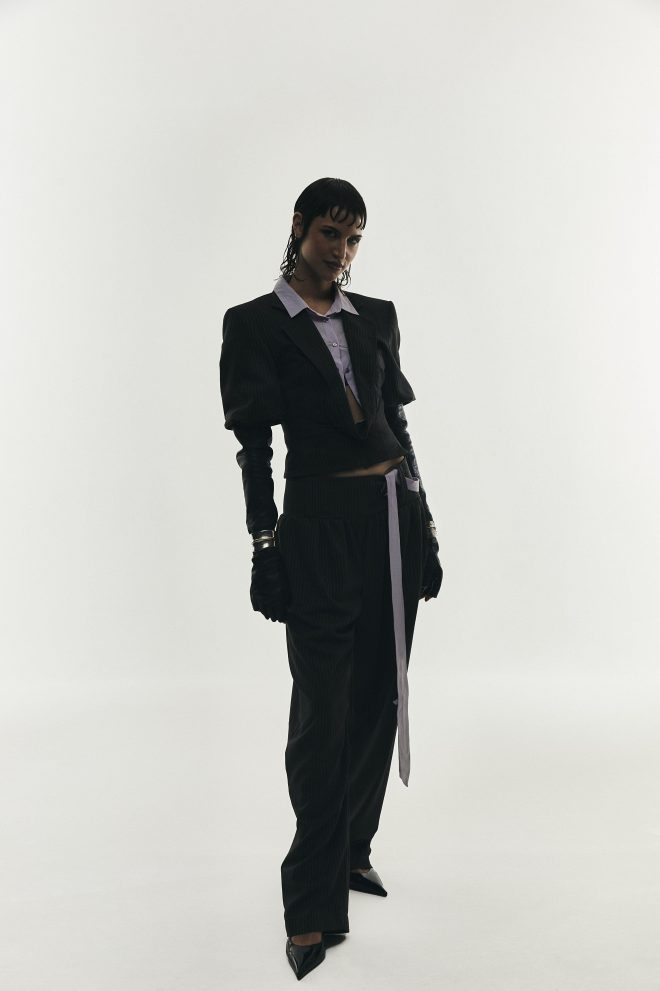Supergloss
Unfollowing trends, embracing identity: supergloss and the future of trance

In an electronic music industry driven by speed, algorithms, and ephemeral aesthetics, few voices resonate as powerfully and authentically as SUPERGLOSS. A producer whose path defies easy categorization, she is less interested in being part of the hype cycle and more focused on cultivating a sound that reflects inner clarity rather than outer noise. With a debut EP, Space Office, released on the legendary Noom Records, SUPERGLOSS has crafted a statement of intent: nostalgic yet forward-thinking, rooted in trance yet unbound by it. In this conversation, we explore not only the sonic DNA of her music but the personal philosophies that fuel her craft.
If I had to describe SUPERGLOSS in my own words, I’d call her a sonic existentialist—an artist who finds transcendence not in mimicry, but in the radical act of honest creation. Her voice isn’t just articulate; it’s textured, full of nuance, alive with both vulnerability and a fierce sense of conviction. This isn’t someone chasing stages or algorithms. This is someone brave enough to ask the harder questions: Who am I, musically? What’s the cost of staying true to yourself? And what does trance mean in a world where everything—our feeds, our thoughts, our bodies—is accelerating?
“The changes I see in DJing and techno culture, musically and beyond, are more noticeable than ever, because they often feel extremely blatant and predictable. Whether it’s a certain mixing technique or visual aesthetic, the constant repetition of that often feels more like imitation than influence.”
SUPERGLOSS begins our conversation by addressing the elephant in the room: the industry's growing obsession with trends. For her, resisting these superficial shifts is not an act of rebellion, but one of preservation.
“It’s easy to get caught up in this, especially when algorithms flood your timeline and streaming platforms reinforce what’s trending. But placing too much weight on external shifts can make it difficult to stay grounded artistically.”
Instead of turning her gaze outward, she chooses to turn inward.
“I ask myself: Do I truly connect with this, or am I just absorbing it through constant exposure? Does this feel like me?”
It is in this act of self-inquiry that SUPERGLOSS finds her compass. Trends, for her, are not blueprints but gentle whispers to be interpreted.
She carries that ethos into her creative process.
“There is a huge difference between making music to be liked and making music to solely create and produce.”
Her refusal to bend toward expectation is bold.
“Pushing boundaries or true innovation often sounds horrible and uncomfortable at first because our ears are not used to it.”
Instead, she embraces discomfort as a birthplace of originality.
“My approach is to have a sense of direction, knowing where I want the track to go musically, but without trying to reach the widest audience possible. For me, sounding generic is my worst nightmare.”
The result? A fiercely individual voice in a sea of sameness.

I think SUPERGLOSS’s opinions are, quite frankly, a breath of fresh air in a space increasingly fogged up by sameness and surface. What strikes me is not just what she’s saying, but how, with a clarity and calm that cuts through the noise. She’s neither whining about the scene's state nor romanticizing the past. She’s just razor-sharp in her self-awareness, and that’s rare.
Her decision to resist trend cycles isn’t framed as some punkish rebellion. It’s deeper—almost spiritual. A kind of preservation, not just of her sound, but of her sense of self. That inward turn, the questioning—“Do I connect with this, or am I just absorbing it?”—that’s the real work. It’s a level of honesty many artists never reach because the noise outside is just too loud.
So many people shy away from anything that doesn’t get immediate applause or algorithmic validation, but SUPERGLOSS leans in. She invites the awkward, the abrasive, the uncertain—because she knows that’s where something real might live. That kind of thinking doesn’t just push genres forward; it protects her soul from dilution.
Bottom line? SUPERGLOSS isn’t here to be liked. She’s here to be heard. And that makes all the difference.
This individuality is not without its pressures. In a world where metrics often eclipse music, comparison can be a brutal reality. SUPERGLOSS shares a moment of clarity:
“I have this quote in my mind that says, ‘Comparison is the thief of joy.’ At the beginning of my journey as a touring DJ, I was always looking at what was happening left and right, thinking that this was the blueprint for success.”
But as her career evolved, so did her mindset.
“One of the most important realisations for me was that this path is highly individual, shaped first and foremost by how you define success for yourself.”
She acknowledges the utility of a digital footprint, but with a caveat.
“Yes, having a big online presence will boost your career, your bookings, and even your fee, but it won’t make the crowd enjoy your set more.”
That insight reframes the purpose: music as liberation, not obligation.
On the subject of self-doubt—a common affliction among artists—SUPERGLOSS is disarmingly honest.
“There. Is. A. Right. Time. For. Everything. I truly believe that everything happens at the right time.”
With the cadence of someone who has metabolized setbacks into wisdom, she recounts how others' success once cast shadows over her path.
“I used to compare myself to others when I saw them playing the shows I dreamed of, but over time, I realized that their success wasn’t taking anything away from me. It showed me that these milestones were possible.”
It’s this reframing that allowed her to turn envy into inspiration.
“I focus on working on my skills rather than comparing myself as a person, because growth comes from persistence, not rushing the process.”
That persistence bore fruit in the form of Space Office, a debut EP that landed on the revered Noom Records.
“When I finished my EP, I started looking for the right label to release it on. I researched the labels that are active and present in the musical landscape right now, but nothing felt like the right fit.”
Then came a revelation.
“I went through my collection and checked which label I had bought the most tracks from. It turned out to be Noom. I bought their entire catalog. That realization made everything click.”
The decision was more than strategic; it was spiritual.
“Seeing my pink cover with the planet on it, sitting in my collection next to all the tracks that shaped my sound, felt like a homecoming.”
Noom didn’t just accept her vision—they celebrated it.
We move on to trance’s evolution. What was once a genre marked by sweeping emotional builds is now being reinterpreted for an audience raised on TikTok edits and shortened club nights. SUPERGLOSS is attuned to this shift.
“When I play at trance parties, I often notice that audiences expect something much faster and more high-energy.”
The traditional blueprint has shifted.
“Many 90s productions I play have long breakdowns and buildups that last several minutes... but I’ve found that younger crowds today respond differently.”
Still, she views this change not as erosion, but transformation.
“Like in fashion, every genre has its signature codes, and trance is continuously redefining its own.”
SUPERGLOSS’s sound is a testament to this dialogue between past and future.
“With my first solo EP, I wanted to explore my interpretation of my taste in music. The theme was basically to transpose that into 303 basslines, trance gates, and euphoric major melodies.”
Though vintage in references, the execution is anything but retrograde.
“With the technology that I have access to today, it is almost impossible to recreate this edgy, sometimes even unintentional, spontaneous sound of the past. That is why I stepped away from this idea and instead wanted to produce something that is not common today and is hard to put in a box.”
Her relationship to trance is both reverent and radical.
“Trance, in its essence, is about creating a soundtrack for a rave, a feeling of euphoria, energy, and joy that doesn't take itself too seriously.”
This isn’t nostalgia—it’s restoration.
“I see myself as someone who honours the traditional elements of trance while continuing to explore its depth... I want to show people the emotional depth of trance and how it can make you lose yourself in the music.”
Let me know if you'd like this formatted as a styled article or want a short version too!


